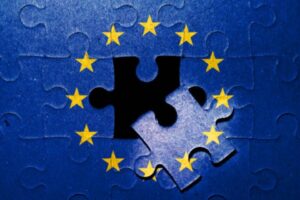As Ukraine has fallen victim to a significant cyber-attack, the European Union has announced that they will respond in-kind with Ukraine against its aggressors, according to two different statements made by the European Council.
According to official reports, a “massive” cyberattack has been launched against Ukraine on 14 January 2022, leading to the leaking of sensitive information of citizens as well as the shutdown of several government websites.
In total, 7 government websites were attacked, including the websites for the Ukrainian Cabinet, Treasury, National Emergency Service, and State Services.
The State Services information base is where Ukrainians’ vaccine passport information and certificates are stored.
After the State Services website was taken down, a message was left on the site in Ukrainian, Russian, and Polish stating that all vaccine passport information has been leaked to the public domain. The message, in part left a warning as well stating that the people and government should “Be afraid and expect the worst. This is for your past, present and future.”
The attack prompted a quick response from the Ukrainian government, according to the spokesman for the Ministry of Foreign Affairs Oleg Nikolenko.
“As a result of a massive cyberattack, the websites of the Ministry of Foreign Affairs and a number of other government agencies are temporarily down,” Nikolenko wrote on Twitter. “Our specialists have already started restoring the work of IT systems, and the cyber police has opened an investigation,” he added.
The attack led to a strong response from the EU as it was preceded by heightened tensions with Russia and Belarus amid what experts are calling a hotbed for a new large-scale war on the border of Ukraine and Russia.
“The European Union strongly condemns the cyberattack against Ukraine on 14 January. This cyber-attack against the Ukrainian government websites is unacceptable. Such actions aim at destabilizing Ukraine and spreading disinformation and could contribute to further escalation of the already tense situation. Ukraine has reacted quickly and decisively to the attacks thanks to its increased cyber resilience,” the Council’s statement reads.
The Council went on to state broadly that the EU will provide support to Ukraine against this attack and future threats, without mentioning specifically what kind of support the country will receive.
“The European Union and its Member States are in contact with Ukraine and stand ready to provide additional, direct, technical assistance to Ukraine to remediate this attack and further support Ukraine against any destabilizing actions, including by further building up its resilience against hybrid and cyber threats. We reconfirm our unequivocal support to Ukraine’s sovereignty and territorial integrity within its internationally recognized borders,” the statement reads.
However, in another statement, the Council said that the EU was adding restrictive measures against more “persons, entities and bodies” in response to the attack. The statement said that they would be amending the Annex to Decision 2014/145/CFSP by adding three additional persons to the list, although it is not made clear in the statement who the individuals are or what the restrictive measures will be.
According to the statement, Montenegro, Albania, and Norway are all candidate countries to back the amendment and align themselves with Ukraine and the Council and will ensure that their national policies conform to the Council’s decision.
Ukraine’s situation with Russia has been ongoing since early 2014 when the war in the country’s eastern region known as Donbas began. The war is largely fought between Ukrainian military forces and separatist forces backed by the Russian military and Russian mercenaries.
The conflict started with the annexation of the Ukrainian Crimea Peninsula by Russian military forces in early 2014.
Recently the Russian military has been amassing troops and equipment on their border with Ukraine, sparking fears worldwide that Russia could actually take further military action against Ukraine, leading to a larger conflict.
More updates on Ukraine’s plight will come as the situation develops.
To read the Council’s statement on backing Ukraine, click this link.
To read the Council’s statement on the amendment to support Ukraine, click this link.
To read more news related to European affairs, click this link.











